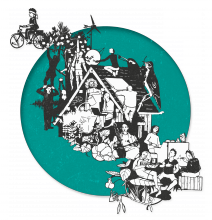Publication Date:

Transition Erleben (Living Transition) was a seminar held recently in Berlin. It dealt with the questions surrounding new growth models.
It encompassed theoretical input before lunch time but also workshops to enable the participants to found little projects and persevere in their engagement. Thus the seminar was more or less a starting point for a longer process. The goal was to avoid the” too-much-information-followed-by-congealment” outcome. The seminar offered an introduction and critical discussion about degrowth, which attracted the corresponding crowd of progressive avant-gardists which some might call radical.
It started with an comprehensive introduction by Jona Blobel (fairbindung e.V. ) about the limits of GDP, limits of resources and sinks, while explaining consistence, efficiency and sufficiency. She also mentioned happiness indices and more specifically the book The Spirit Level: why equality is better for everyone by R. Wilkinson and K. Pickett. She then asked the audience why we need growth. After noting all answers (“to create jobs”, “to finance our social system”, etc.), she challenged them by explaining the process of jobless growth due to rising work productivity, etc.
To present alternative approaches, instead of solely focusing on criticizing the “existing model”, Jona Blobe mlentioned Bhutan and its approach on Gross National Happiness (GNH) (which was followed by various critical questions) and the concept of Buen Vivir. Her way of distinguishing the various different kinds of degrowth/new growth concepts was interesting. According to her it is possible to distinguish between government related approaches (Beyound GDP, Happiness Indices etc.), conservative approaches (e.g. Meinhard Miegel), liberal approaches (to free from growth constraints, Seidl and Zarnth) and the solidarity degrowth concept, with the approach of tackling inequality first (Brandt, Schmelzer and Passadakis).
Unsurprisingly, Nico Paech’s approaches were cited, such as the 20-hours-work-week. This week would then be supplemented by subsistence activity, shareconomy, re-regionalization and collaborative consumption.
The majority of participants was evidently focused on a change within the social system, highlighting the need for a change in culture and paradigms and even ‘mental infrastructures’ (Harald Welzer). Whether this is enough or even hypocritical (since the majority of participants has flown in the past – all of them have footprints way above all acceptable average global citizen sizes) was discussed very controversially.
This discussion took place in the end of the seminar in a fishbowl. Using this discussion framework, only four people were discussing in the middle of a circle (of all participants). However, they could exchange with everybody very easily. Thus the discussion remained inclusive and interactive.
Beforehand, the green growth approach was represented by Klaus Jacob (FU Berlin), who rather highlighted the idea of building an eco state, comparable to the welfare state. Felix Holtermann presented his thesis about the feasibility of implementing degrowth approaches into policy (he sends his thesis upon request) – coming to a mixed conclusion.
In order to keep the energy of the participants up, best practice examples such as the Transition Town Initiative in Eberswalde were also presented (by Ingo Frost). The remarkable film "Voices of Transition" by Nils Aguilar was also quite motivating.
In conclusion, one could see new and old ideas on dealing with the environmental crisis, which very significantly shaped by the current/last year debate about “green growth vs. degrowth”.
It appeared that new approaches, such as moving towards ‘a growth’ or New Growth Models (Michael Spence) – which go beyond the green growth idea – did still not enter public debate.
In any case, there is a new generation (however, mainly within academic and activist groups) which is very critical about Green Growth and Sustainability concepts and which is concerned about the acuteness of environmental challenges. The obvious dilemma of being radical and strict (avoiding flights and having a vegetarian diet), while still having immense footprints is very present in this generation.
Being courageous and building up (even small scale) alternatives, while trying to use the top-down approach too, seems to be a motivating and fruitful way.
“You never change things by fighting the existing reality. To change
something, build up a new model that makes the existing model obsolete.”
R. Buckminster Fuller
Marius Hasenheit
[Marius writes his Master thesis within the NETGREEN project and works part time for Ecologic Institute. He holds a BSc in BioGeoSciences and is currently enrolled in the MSc Global Change Ecology program. In his work, he will focus on the relationships between the indicators and search for synergies and trade-offs. He is dedicated to the combination of social and ecological policy making.]
The Seminar took place in German in KuBiZ Raoul Wallenberg (Weissensee/Berlin, Germany)
24th. - 27th. of April
